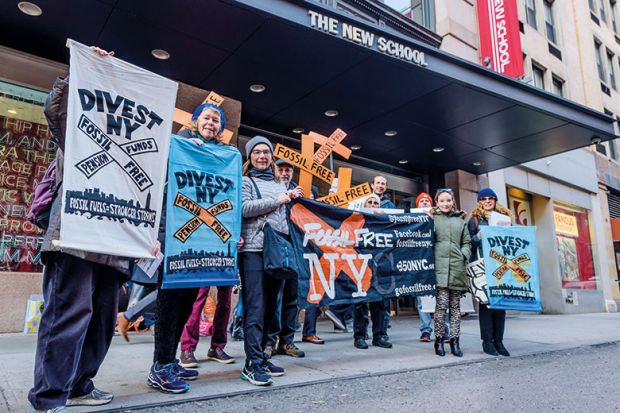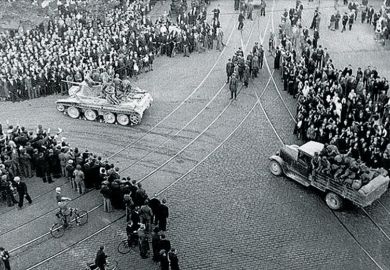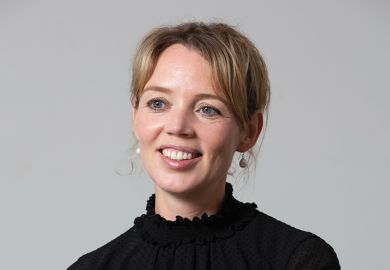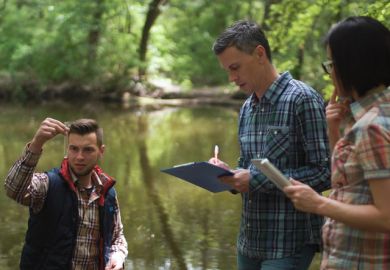Judith Friedlander’s engaging intellectual history of The New School for Social Research in New York appears at a timely moment – against a backdrop of renewed debates about free speech and academic freedom on college campuses, and the rise of illiberalism worldwide. As the school celebrates its centennial, she lifts the curtain on academic administration, inviting us to the front lines of these battles. While looking at the past, she draws attention to contemporary crises in higher education, offering an insider’s view of academia in the US. She herself was dean of the graduate faculty at the New School from 1993 to 2000.
One hundred years ago, James Harvey Robinson and Charles Beard left Columbia University in an act of political protest and founded what would become the New School. Columbia was firing faculty who spoke out against US involvement in the First World War for “sedition”. Robinson and Beard quit not because they were against the war, but because they refused to support an institution that was not committed to academic freedom. They were quickly joined by other frustrated intellectuals such as John Dewey and Thorstein Veblen. Ever since, the New School has been home to some of the world’s leading minds: John Maynard Keynes, Harold Laski, Margaret Mead, Karen Horney, Erich Fromm, Frank Lloyd Wright, W. H. Auden, Tennessee Williams, Jack Kerouac, James Baldwin and Hannah Arendt, to name but a few.
In the beginning, the aim of the New School was clear: “to make social research of immediate assistance to a bewildered and groping American democracy”. Like the Institut d'Études Politiques de Paris (Sciences Po) in Paris, which was founded in 1872, the year after France surrendered to Germany in the Franco-Prussian War, and the Institut für Sozialforschung (institutional home of the Frankfurt School), set up in 1923 as a response to the fallout from the First World War, the New School appeared as a bastion of academic freedom during a moment of political crisis. Friedlander emphasises that Robinson and Beard also left Columbia amid a “power struggle” that had been going on for years, there and at other universities, as boards of trustees were “refashioning the governance structure of academic institutions to resemble business corporations”, minimising faculty autonomy.
If Columbia University and boards of trustees appear as villains in Friedlander’s history, then Alvin Johnson emerges as a superhero. As a co-founder and president from 1922 to 1946, he not only stewarded the New School through a tumultuous era, but saved innumerable scholars who were forced to flee the horrors of fascism, bringing more than 200 people to the New School alone. In 1933, when the Nazi Party took power, Johnson raised money to found the University in Exile there as a home for thinkers escaping persecution and, when France fell to the Nazi invasion, he worked to establish the École libre des hautes études as a graduate division of the University in Exile, receiving a charter from de Gaulle’s Free French government. In 1934, the University in Exile was renamed the Graduate Faculty, and in 2005 the name was restored to The New School for Social Research. Today, the school continues to change, recently launching its New University in Exile Consortium, partly in response to Hungarian prime minister Viktor Orbán’s attack on Budapest’s Central European University.
The story of the New School is full of squabbles – some significant, some petty. In 1938, Hans Staudinger, together with a few New School colleagues, began working on a translation of the first unabridged edition of Adolf Hitler’s Mein Kampf for Houghton Mifflin, which would ensnare the school in legal battles that went all the way up to the Supreme Court. What was at stake? The publishing house Stackpole and Sons announced that it was also publishing a translation of Mein Kampf, and challenged Houghton Mifflin’s claim that it alone had the rights to publication. This was complicated by the fact that, when Hitler’s publisher got word of the translation, it “requested copyright protection on behalf of their author”. In the end, Hitler never received royalties.
Friedlander’s book focuses on the transitional moments that have shaped the New School. In this way, its history is also a history of the 20th century: the First World War, the Great Depression, the Red Scare, the rise of fascism and totalitarianism in Europe, McCarthyism, the Vietnam War, the fall of communism in eastern Europe. Under the direction of John (Jack) Everett from 1964 to 1982, the school weathered and grew from the student protest movement that swept Europe and the US in the late 1960s. In the 1990s, we read, then president Jonathan Fanton “used the school as a platform for taking stands in national debates about freedom of expression”, turning protests into teaching opportunities.
The voices of Hannah Arendt and Ira Katznelson echo throughout as guiding interlocutors, reflecting on the intimate relationship between our political moment and the moral responsibility of academic institutions. Katznelson left the University of Chicago in 1983 for the New School. Together with Fanton, he stepped forward to defend the rights of persecuted intellectuals in east and central Europe. When he left in 1994, accepting a position at Columbia University, Fanton asked him to deliver the commencement address. Friedlander ends her history by summarising Katznelson’s prescient words: “The New School’s European colleagues, he said – both those of the generation of 1933 and those of 1989 – saw the weakness in liberal democracies more clearly than their American counterparts. Given their experiences with totalitarian regimes, the Europeans understood ‘that all liberal regimes are built on foundations of state violence and coercion, and that these instruments in the basements of the state can be used to topple the upper floors of open societies. At best, they remain in place as hidden instruments of rule’.”
Friedlander is close to the topic that she is writing about; there is a kind of pride and cheekiness in her telling that marvels at the remarkable history of the New School. Each section could easily have made a volume in its own right, with the wealth of archival material and letters filling the pages. These are essential and gripping stories, and to appreciate the full significance of the role that The New School has played one wants to linger a bit longer on the particular lives that have sustained its existence. A couple of paragraphs about Johnson’s back-story seem hardly adequate for a man who comes off as nothing less than a great American hero.
The title of the book comes from Arendt’s Men in Dark Times (1974), itself referring to a famous poem by Bertolt Brecht. Even in the darkest time, she writes, “we have the right to expect some illumination, and that illumination might well come less from theories and concepts than from the uncertain, flickering, and often weak light that some men and women, in their lives and their works, will kindle under almost all circumstances and shed over the time span that was given to them.”
The many founders of the New School were true public intellectuals, journalists, academics and philanthropists. Friedlander’s record of their lives and work emerges as a light in these dark times, offering us a portrait of how an institution takes shape, a vision for thinking about how universities can fail and some ideas about how they might be renewed amid the chaos of our current moment. This work will surely be of interest to anyone who is committed to academic freedom and democratic education.
Samantha Hill is visiting assistant professor of politics – and assistant director of the Hannah Arendt Center for Politics and Humanities – at Bard College. She is working on a translation of Hannah Arendt’s poems and has just finished a memoir about sexual violence in academia.
A Light in Dark Times: The New School for Social Research and Its University in Exile
By Judith Friedlander
Columbia University Press, 484pp, £30.00
ISBN 9780231180184
Published 5 February 2019
The author
Judith Friedlander, who retired from the State University of New York and City University of New York in 2017, was born in New York City but moved to Long Island as an infant. Her
parents, she says, thereby “left the crowded city together with thousands of other upwardly mobile Jews, children, for the most part, of east European immigrants” and entered
“a community of wealthy White Anglo-Saxon Protestants [which soon] became known pejoratively as the ‘golden ghetto’ ”.
Apart from a year of graduate school at Harvard University, Friedlander studied entirely at the University of Chicago. Politically active herself, she became fascinated by “the rise of separatist political movements – based on ethnic, racial and gender identity”. Her doctoral research “looked at the ways a colonised people – indigenous Mexicans – interpreted their ethnic identity” from the time of the Spanish conquest, although it was only later that she realised that her analysis was “deeply influenced by debates in the literature on antisemitism and the Jewish question”. She then turned directly to studying “French Jewish intellectuals of the generation of 1968”. A Light in Dark Times allowed her to develop her interest in antisemitism and Jews, while “expanding the subject to look more broadly at the role intellectuals and their academic institutions have played in framing debates about academic freedom, difference and human rights”.
Today, in the light of “a refugee crisis the likes of which we have not seen since 1945”, Friedlander would like “our universities to follow the model of The New School by providing safe havens for the intellectuals among them. Furthermore, given the debates raging on university campuses about academic freedom, this is also the time to remember how the founders of The New School campaigned for freedom of expression by standing up for the rights of people with whom they disagreed…”
Matthew Reisz
Register to continue
Why register?
- Registration is free and only takes a moment
- Once registered, you can read 3 articles a month
- Sign up for our newsletter
Subscribe
Or subscribe for unlimited access to:
- Unlimited access to news, views, insights & reviews
- Digital editions
- Digital access to THE’s university and college rankings analysis
Already registered or a current subscriber?








